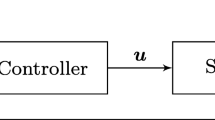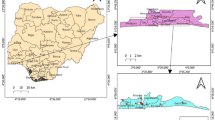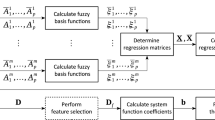Abstract
This paper proposes an iterative approach in fuzzy model predictive control. When the prediction model is nonlinear or uncertain, non-convex optimization is often encountered which has to be solved by iterative approximation. An alternative is to convert the original issue into a min-max robust MPC problem, where the knowledge of the predictive membership function is not utilized. In this paper, based on the robust MPC approach, we further enhance the model prediction by iteratively applying the optimal control move and state sequences in order to improve the performance. A numerical example is provided to illustrate the effectiveness of the proposed approach.
Similar content being viewed by others
References
T. Takagi and M. Sugeno, “Fuzzy identification of systems and its applications to modeling and control,” IEEE Transactions on Systems, Man, and Cybernetics, vol. SMC-15. no. 1, pp. 116–132, 1985.
Z. Zhang, T. Wang, Y. Chen, and J. Lan, “Design of type-2 fuzzy logic systems based on improved ant colony optimization,” International Journal of Control, Automation and Systems, vol. 18, no. 1, pp. 536–544, 2020.
W. Zheng, Z. M. Zhang, H. B. Wang, H. R. Wang, and P. H. Yin, “Stability analysis and dynamic output feedback control for nonlinear T-S fuzzy system with multiple subsystems and normalized membership functions,” International Journal of Control, Automation and Systems, vol. 16, no. 11, pp. 2801–2813, 2018.
K. Tanaka, T. Ikeda, and H. O. Wang, “Fuzzy regulators and fuzzy observers: Relaxed stability conditions and LMI-based designs,” IEEE Transactions on Fuzzy Systems, vol. 6, no. 2, pp. 250–265, 1998.
C. H. Fang, Y. S. Liu, S. W. Kau, L. Hong, and C. H. Lee, “A new LMI based approach to relaxed quadratic stabilization of T-S fuzzy control systems,” IEEE Transactions on Fuzzy Systems, vol. 14, no. 3, pp. 386–397, 2006.
G. Feng, C. L. Chen, D. Sun, and Y. Zhu, “H∞ controller synthesis of fuzzy dynamic systems based on piecewise Lyapunov functions and bilinear matrix inequalities,” IEEE Transactions on Fuzzy Systems, vol. 13, no. 1, pp. 94–103, 2005.
K. Tanaka, T. Hori, and H. O. Wang, “A multiple Lyapunov function approach to stabilization of fuzzy control systems,” IEEE Transactions on Fuzzy Systems, vol. 11, no. 4, pp. 582–589, 2003.
T. M. Guerra and L. Vermeiren, “LMI-based relaxed non-quadratic stabilization conditions for nonlinear systems in the Takagi-Sugeno's form,” Automatica, vol. 40, no. 5, pp. 823–829, 2004.
D. H. Lee, J. B. Park, and Y. H. Joo, “Improvement on nonquadratic stabilization of discrete-time Takagi-Sugeno fuzzy systems: multiple-parameterization approach,” IEEE Transactions on Fuzzy Systems, vol. 18, no. 2, pp. 425–429, 2010.
X. Xie, H. Ma, Y. Zhao, D. W. Ding, and Y. Wang, “Control synthesis of discrete-time T-S fuzzy systems based on a novel non-PDC control scheme,” IEEE Transactions on Fuzzy Systems, vol. 21, no. 1, pp. 147–157, 2013.
B. Ding, “Homogeneous polynomially nonquadratic stabilization of discrete-time Takagi-Sugeno systems via non-parallel distributed compensation law,” IEEE Transactions on Fuzzy Systems, vol. 18, no. 5, pp. 994–1000, 2010.
K. Sun, S. Mou, J. Qiu, T. Wang, and H. Gao “Adaptive fuzzy control for non-triangular structural stochastic switched nonlinear systems with full state constraints,” IEEE Transactions on Fuzzy Systems, vol. 27, no. 8, pp. 1587–1601, 2019.
J. Qiu, K. Sun, T. Wang, and H. Gao, “Observer-based fuzzy adaptive event-triggered control for pure-feedback nonlinear systems with prescribed performance,” IEEE Transactions on Fuzzy Systems, vol. 27, no. 11, pp. 2152–2162, 2019.
D. Q. Mayne, “Model predictive control: Recent developments and future promise,” Automatica, vol. 50, no. 12, pp. 2967–2986, 2014.
W. Yang, J. Gao, G. Feng, and T. Zhang, “An optimal approach to output-feedback robust model predictive control of LPV systems with disturbances,” International Journal of Robust & Nonlinear Control, vol. 26, no. 15, pp. 994–1000, 2016.
Y. Song, Z. Wang, D. Ding, and G. Wei, “Robust H2/H∞ model predictive control for linear systems with polytopic uncertainties under weighted MEF-TOD protocol,” IEEE Transactions on Systems, Man, and Cybernetics: Systems, vol. 49, no. 7, pp. 1470–1481, 2017.
H. Zheng, T. Zou, J. Hu, and H. Yu, “An offline optimization and online table lookup strategy of two-layer model predictive control,” IEEE Access, vol. 6, pp. 47433–47441, 2018.
Q. Lu, P. Shi, H. K. Lam, and Y. Zhao, “Interval type-2 fuzzy model predictive control of nonlinear networked control systems,” IEEE Transactions on Fuzzy Systems, vol. 23, no. 6, pp. 2317–2328, 2015.
T. Wang, H. Gao, and J. Qiu, “A combined adaptive neural network and nonlinear model predictive control for multi-rate networked industrial process control,” IEEE Transactions on Neural Networks and Learning Systems, vol. 27, no. 2, pp. 416–425, 2015.
M. Killian, B. Mayer, A. Schirrer, and M. Kozek, “Cooperative fuzzy model predictive control,” IEEE Transactions on Fuzzy Systems, vol. 24, no. 2, pp. 471–482, 2016.
S. Bououden, M. Chadli, and H. R. Karimi, “A robust predictive control design for nonlinear active suspension systems,” Asian Journal of Control, vol. 18, no. 1, pp. 122–132, 2016.
L. Teng, Y. Wang, W. Cai, and H. Li, “Fuzzy model predictive control of discrete time systems with time-varying delay and disturbances,” IEEE Transactions on Fuzzy Systems, vol. 26, no. 3, pp. 1192–1206, 2018.
S. Mollov, R. Babuska, J. Abonyi, and H. B. Verbruggen, “Effective optimization for fuzzy model predictive control,” IEEE Transactions on Fuzzy Systems, vol. 12, no. 5, pp. 1192–1206, 2004.
Y J. Wang and J. B. Rawlings, “A new robust model predictive control method I: theory and computation,” Journal of Process Control, vol. 14, no. 3, pp. 231–247, 2004.
B. Ding, “Properties of parameter-dependent open-loop mpc for uncertain systems with polytopic description,” Asian Journal of Control, vol. 12, no. 1, pp. 58–70, 2010.
O. M. Scokaert, D. Q. Mayne, and J. B. Rawlings, “Sub-optimal model predictive controller (feasibility implies stability),” IEEE Transactions on Automatic control, vol. 44, no. 3, pp. 648–654, 1999.
D. Q. Mayne, J. B. Rawlings, C. V. Rao, and P. O. M. Scokaert, “Constrained model predictive control: Stability and optimality,” Automatica, vol. 36, no. 6, pp. 789–814, 2000.
J. Schuurmans and J. A. Rossiter, “Robust predictive control using tight sets of predicted states,” IEE-Control Theory and Applications, vol. 147, no. 1, pp. 13–18, 2002.
Author information
Authors and Affiliations
Corresponding author
Additional information
Publisher's Note Springer Nature remains neutral with regard to jurisdictional claims in published maps and institutional affiliations.
Recommended by Associate Editor Jiuxiang Dong under the direction of Editor Euntai Kim. This work is supported by NSFC-Zhejiang Joint Fund for the Integration of Industrialization and Informatization (No. U1809207).
Yuangqing Yang received his M.S. degree from Northwestern Polytechnical University, and his Ph.D. degree from Xi'an Jiao-tong University. His research interest include model predictive control, network control, and distributed control systems.
Baocang Ding was born in Hebei Province, China. He received his M.S. degree from the China University of Petroleum, Beijing, China, in 2000 and a Ph.D. degree from Shanghai Jiaotong University, Shanghai, China, in 2003. From September 2005 to September 2006, he was a Postdoctoral Research Fellow in Department of Chemical and Materials Engineering, University of Alberta, Canada. From November 2006 to August 2007, he was a Research Fellow in the School of Electrical and Electronic Engineering, Nanyang Technological University, Singapore. Dr. Ding was the recipient of the 2009 Program for New Century Excellent Talents in University of China. He is currently a full Professor with Chongqing University of Posts and Telecommunications. His research interests include predictive control, fuzzy control, networked control, and distributed control systems.
Rights and permissions
About this article
Cite this article
Yang, Y., Ding, B. An Iterative Optimization Approach for Fuzzy Predictive Control. Int. J. Control Autom. Syst. 18, 2157–2164 (2020). https://doi.org/10.1007/s12555-019-0488-4
Received:
Revised:
Accepted:
Published:
Issue Date:
DOI: https://doi.org/10.1007/s12555-019-0488-4




